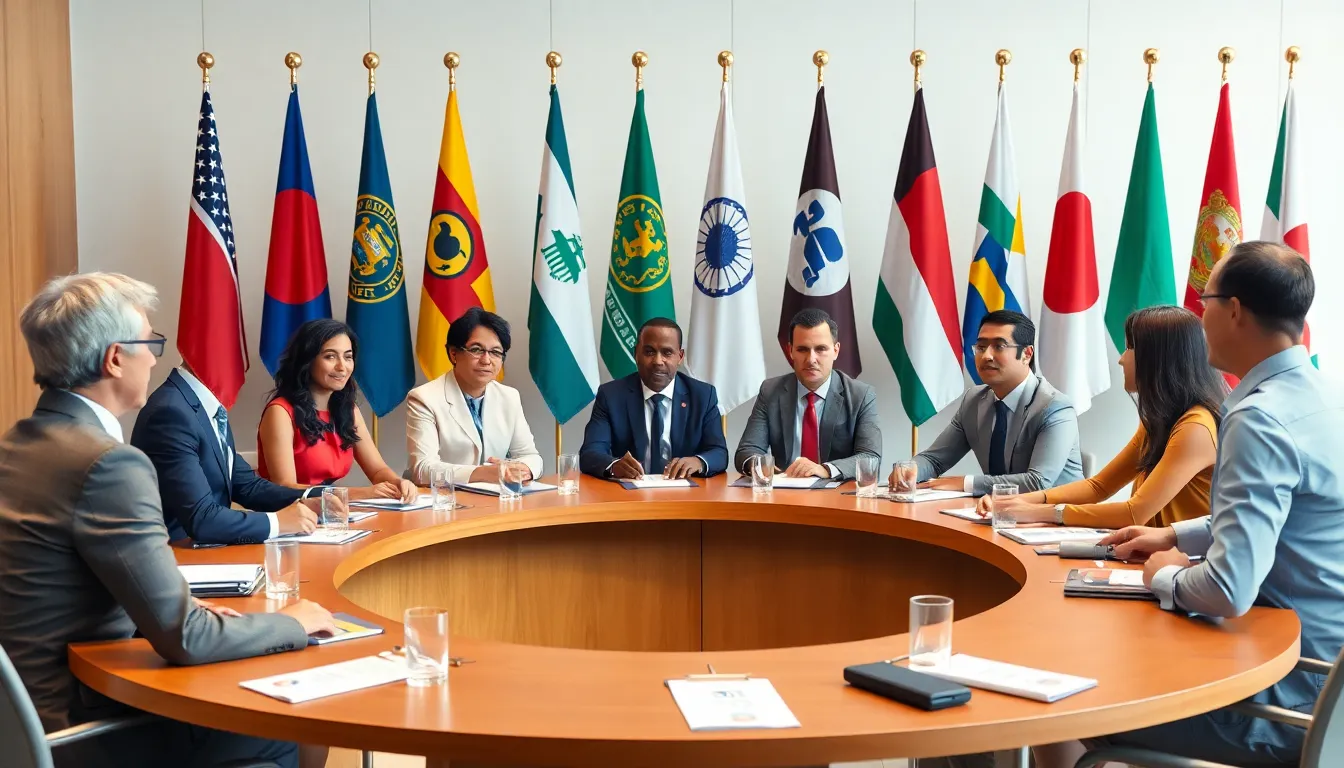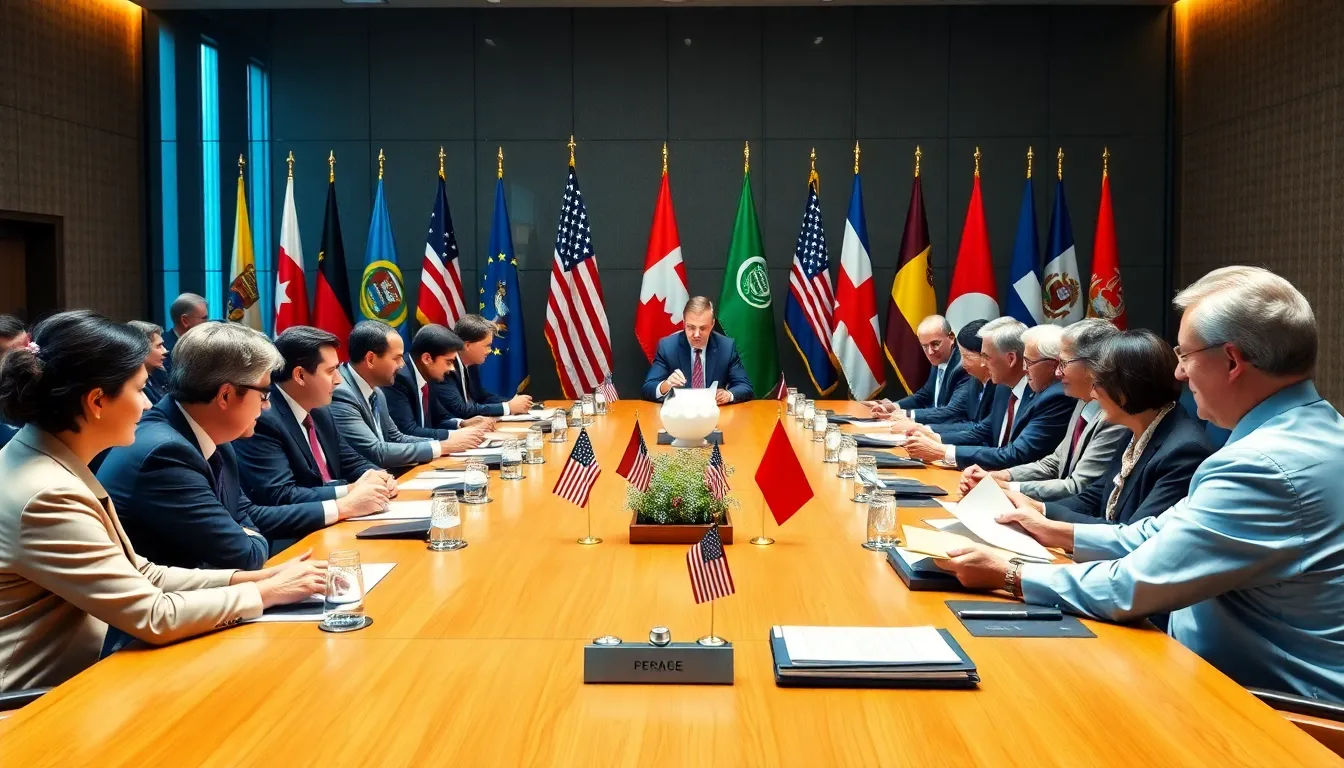In a world where borders are increasingly blurred, the dynamics of international relations are constantly evolving. From shifting alliances to emerging global powers, staying informed about the latest updates is crucial for understanding how these changes impact global stability and cooperation.
Recent developments across various regions have sparked debates and shaped policies, making it essential for individuals and policymakers alike to keep a finger on the pulse of international affairs. As nations navigate complex challenges, the interplay of diplomacy, economics, and security continues to define the global landscape.
This article delves into the most significant updates in international relations, offering insights into the factors driving change and their implications for the future. Whether it’s geopolitical tensions or collaborative efforts, these updates shed light on the intricate web of interactions that shape our world today.
Table of Contents
ToggleCurrent Global Politics Landscape
The current global politics landscape reflects a complex interplay of power, interests, and emerging challenges. Significant events and actions unfold, influencing international relations and reshaping alliances.
Key Players in International Relations
- United States: The U.S. maintains its position as a dominant global actor, driving NATO initiatives, imposing sanctions, and leading in international trade agreements.
- China: China’s rapid economic growth and assertive foreign policy redefine its role, focusing on the Belt and Road Initiative and expanding influence in Asia and Africa.
- Russia: Russia’s military engagements and energy resources reinforce its status in geopolitical tensions, particularly in Eastern Europe and the Middle East.
- European Union: The EU strives for unity in foreign policy, addressing issues like climate change, migration, and trade with non-member countries while facing internal challenges.
- India: India’s increasing economic power and strategic partnerships enhance its role in regional security and international forums, notably influencing South Asia.
Emerging Regions of Interest
- Africa: Africa’s growing economic potential and youthful demographics attract foreign investment, with countries like Kenya and Nigeria leading the way in technology and finance.
- Southeast Asia: Nations such as Vietnam, Indonesia, and the Philippines grow economically and politically, engaging with global trade while countering China’s influence.
- Latin America: Political shifts in Brazil, Colombia, and Mexico signal changing dynamics, as these countries explore partnerships to address climate change and economic recovery.
- Middle East: Recent normalization agreements among Arab nations and Israel spark new alliances, while ongoing conflicts demand international attention and mediation.
- Arctic Region: Melting ice opens new shipping routes and resource access, prompting interest from nations like Russia, Canada, and the U.S. in geopolitics and environmental security.
Recent Developments in International Diplomacy


Recent developments in international diplomacy reflect ongoing efforts to foster peace and cooperation among nations. Notable treaties and high-stakes summits play crucial roles in shaping the current geopolitical landscape.
Noteworthy Treaties and Agreements
Multiple treaties and agreements shaped recent international relations.
- Paris Agreement: Countries recommitted to carbon neutrality goals, emphasizing the urgency of climate change.
- Abraham Accords: Expansions in normalization agreements among Middle Eastern nations lead to enhanced trade and security collaborations.
- Bilateral Trade Agreements: The U.S. and several South American countries established trade deals to boost economic growth and counteract regional instability.
- Nuclear Non-Proliferation Agreements: Countries engaged in dialogues to reduce nuclear arsenals and ensure the peaceful use of nuclear energy, reinforcing global security.
Summit Highlights and Outcomes
Recent summits yielded significant outcomes that influence global diplomacy.
- G20 Summit: Leaders discussed post-pandemic economic recovery, emphasizing sustainability and digital transformation.
- NATO Annual Meeting: Member states focused on collective defense strategies, addressing emerging threats from aggressive state actors.
- UN Climate Change Conference: Nations outlined strategies for achieving climate targets, highlighting financial support for developing countries.
- ASEAN Summit: Participants addressed regional security and economic cooperation amid rising geopolitical tensions in the Asia-Pacific.
These developments reflect the complexities and collaborative efforts that underline current international relations.
Impact of Global Events on International Relations
Global events significantly shape international relations by influencing policy decisions, economic strategies, and diplomatic engagements among nations. Analyzing these impacts helps understand the evolving geopolitical landscape.
Effects of Economic Changes
Economic changes affect international relations through trade policies, sanctions, and investment flows. Recent shifts toward protectionism among several countries highlight the growing influence of domestic economics on global trade dynamics. For instance, tariffs imposed by the U.S. on Chinese imports altered trade patterns, prompting retaliatory measures that impacted supply chains worldwide. Improved economic performance in nations like India and Vietnam also positions them as key players in regional trade agreements, fostering alliances that enhance their global stature. Moreover, the rising importance of digital currencies and fintech innovations is prompting nations to adapt their financial regulations, influencing international economic interactions.
Responses to Environmental Crises
Responses to environmental crises shape international relations as countries collaborate to address global challenges such as climate change. The 2021 UN Climate Change Conference (COP26) highlighted commitments by various nations to reduce greenhouse gas emissions and transition to renewable energy sources. Significant partnerships, such as the U.S.-Europe Climate Partnership, aim to collectively address climate goals while enhancing energy security. Furthermore, natural disasters, like those caused by climate change, necessitate humanitarian responses that often involve multinational cooperation, thereby strengthening diplomatic ties. Countries that actively engage in climate initiatives, such as reforestation or carbon trading, often gain diplomatic leverage and forge new alliances based on shared environmental goals.
Future Trends in International Relations
Future trends in international relations signal a shift in how nations collaborate and address global issues. Emerging dynamics point toward an increase in multilateralism, digital diplomacy, and environmental cooperation.
Predictions for Global Cooperation
Predictions for global cooperation indicate a rise in collective problem-solving frameworks. Multilateral agreements are expected to play a pivotal role in climate action and public health responses. The ongoing push for stronger international collaborations aims to address pressing global challenges such as pandemics, climate change, and cybersecurity threats.
Countries will likely prioritize partnerships with regional organizations, enhancing connectivity and trade. For example, increased participation in platforms like the G20 and ASEAN will facilitate dialogue among key global players. Additionally, technology-driven diplomacy through virtual summits and online negotiations is set to transform traditional diplomatic exchanges, allowing for real-time collaboration regardless of geographical boundaries.
Challenges Ahead for Diplomacy
Challenges ahead for diplomacy include rising nationalism, economic competition, and technological disruption. Nationalistic policies may strain diplomatic relations, as countries prioritize self-interests over collaborative solutions. For instance, trade conflicts could intensify as nations reinforce protectionist measures in response to economic downturns.
Technological advancements introduce complexity into international negotiations, creating disparities in capabilities among nations. Cybersecurity threats may also complicate traditional diplomacy as governments navigate issues of trust and vulnerability. As a result, the diplomatic landscape will require adaptive strategies to manage these multifaceted challenges while maintaining international cooperation.



